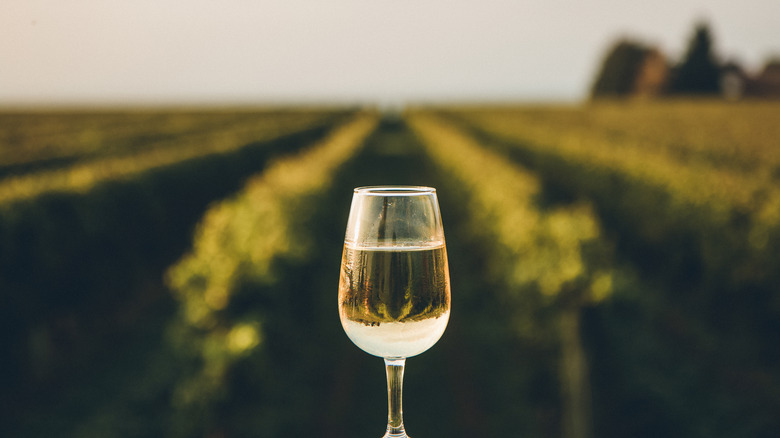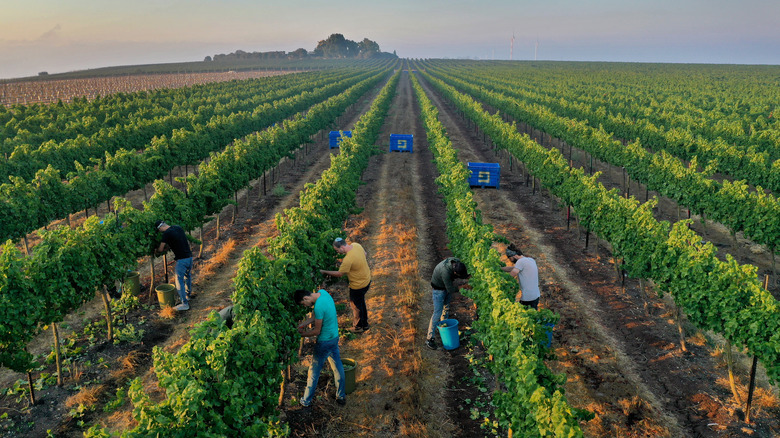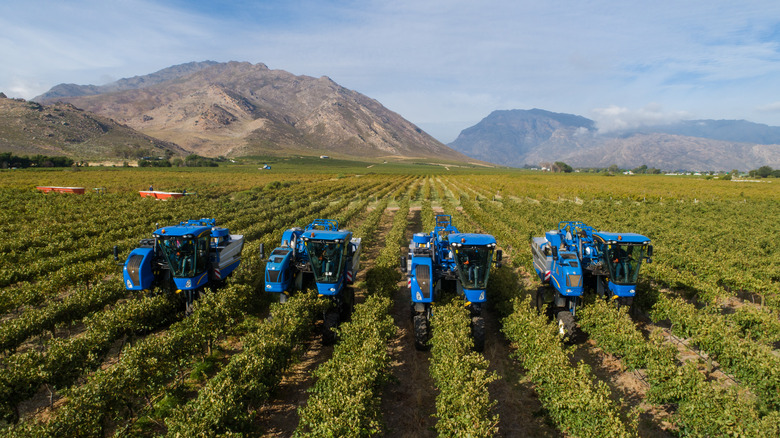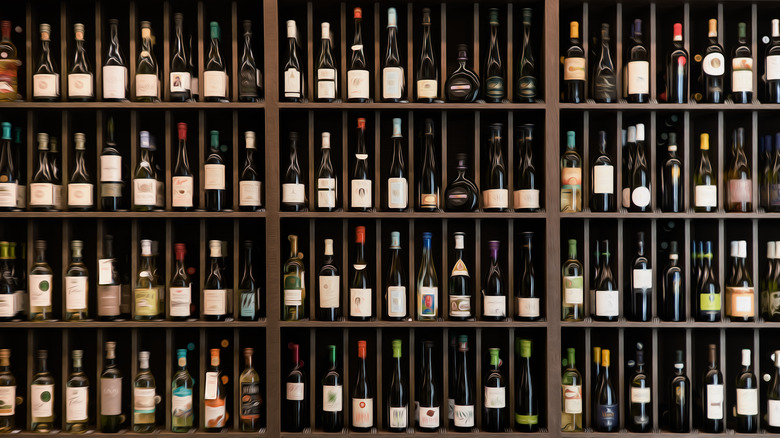Natural Wine Vs. Conventional Wine: Is There Really A Difference?
If you are a wine drinker, you may have started to notice an increase in labeling and marketing terms over the past couple of years. Wines described as "organic," "biodynamic," and "natural" have all found a steady place on store shelves. These terms indicate a flip side to the product, commonly referred to as conventional wine. Since wine is first and foremost an agricultural product, it consists of variable farming techniques. While most are probably familiar with the concept of organic food, natural wine goes a step beyond.
For the average consumer, purchasing wine is already complicated enough. Different colors, styles, grapes, and origins mean the list of options is seemingly endless. While it's clear that conventional and natural wine are somehow opposing, an absence of regulations can result in confusion. At the most basic level, Vox explains conventional wines are made using additives and chemicals in the vineyard and winery, whereas natural wines are often described as "nothing added, nothing taken away."
There are definitely strong opinions, debates, and controversies surrounding the two styles. While some people strive for purity in wines and think that everything beyond should be avoided, it's important to follow your own beliefs. If you are happy drinking a certain wine and are fine with the way it is made, then don't hesitate to revel in your enjoyment.
What is natural wine?
Although a recent cult following has exploded surrounding natural (also natty, raw, real, living, and low intervention) wine, it was, in fact, the original way that wine was made before industrialization, according to Vox. Isabelle Legeron, creator of the natural wine fair RAW wine, explains that it is a fluid term that requires context. Although the goal is to intervene as little as possible, Legeron recognizes that minor tweaks in the viticultural or winemaking process can dictate whether an entire year's work succeeds.
As such, Legeron notes that there is no official agreement among countries, let alone people, as to what is permitted. All the same, a handful of factors are consistent across definitions for natural wine, including the latest one published in "The Oxford Companion to Wine," per Wine Folly. First and foremost, grapes should be hand harvested from environmentally friendly vineyards, such as those deemed sustainable, organic, or biodynamic. Next, fermentation is spontaneous, which means it should occur due to the wild yeast in the vineyards and cellars. This is comparable to the process of making kombucha and other fermented foods, and HuffPost reports that similar gut-health benefits are noted.
Finally, there should be no additives during any part of the natural winemaking process, though sulfites are regularly a point of debate. Depending on the region and rigidity of its definition, a small quantity of added sulfites are permitted (via Vox). Natural wines are rarely clarified or stabilized to retain their living characteristics, often appearing cloudy.
What is conventional wine?
You could say that conventional wine is all wine made with technical or chemical intervention. This can indicate the use of pesticides and herbicides in the vineyards, machine harvesting to pick the grapes, lab cultured yeast to initiate fermentation, and more than 60 FDA permitted additives before bottling, explains Vox. The source remarks that, if a wine isn't properly balanced, winemakers can manipulate concentrations of acidity, alcohol, sugar, flavor, and color so that it conforms into the wine they want it to be. When it comes to sulfites, conventional wines can have up to 10 times more than the maximum allowed for natural wines (via Vox).
Conventional wines are also generally clarified and stabilized to remove any potential bacteria, sediment, or living yeast that could lead to transformations in the wine (via Wine n' About). If you consider the large scale and volume of conventional wine, The Healthy points out that it only makes sense to minimize potential spoilage by whatever means necessary. However, if you follow a vegan or vegetarian diet, it is important to note that some of the methods used to clarify and stabilize wine derive from animal sources (via Wine Enthusiast).
While it can be easy to vilify this method of winemaking, realistically, not all wine can be made on a small artisanal scale. Many processes in conventional winemaking reduce costs by transferring the work to machines and chemicals, instead of people and time.
Is there a nutritional difference?
Proponents of natural wine often assert that thanks to its pure composition, they don't suffer from headaches or hangovers, Sarah Marjoram, RD tells Real Simple. Sulfites are often flagged as the culprit, but Marjoram reports no scientific evidence supporting this assumption. Furthermore, Harvard Health points out that sulfites are more likely to cause breathing issues. While a small percentage of the population are indeed allergic to sulfites, chances are you are ingesting far more from canned and pickled products, dried fruits, chips, and other ordinary food items, according to Allergy Amulet.
Aside from the alcohol content, Vinepair remarks that sugar is also responsible for causing headaches and hangovers. Since natural winemaking does not permit the addition of sugar to boost alcohol levels and body, the final product is lower in both elements (via Usual). These factors, as well as the lack of chemical additives, might explain why people feel better after a night consuming natural versus conventional wine.
Although wine contains antioxidants, not all grapes are created equal. Wine Spectator explains that darker colored wine usually means higher levels of polyphenols, the group of antioxidants found in grapes. Dry Farm Wines likens polyphenols to "guardians," noting that they act to protect grapes against disease and bacteria, much like their function in our bodies. According to HuffPost, when grapes are grown with chemicals, they don't need to create as many polyphenols since the chemicals provide protection. Thus it's safe to conclude that conventional wines contain less antioxidants compared to natural wines.
Why do some people feel one is better than the other?
Once you read through the list of FDA approved wine additives detailed on The Feiring Line, you might also find yourself gravitating towards natural wines. However, a nuanced point of view is helpful. Not all conventional wines use dozens of additives and some may approach the low intervention category. Comparing wine to food is also a good exercise 一 If you regularly eat processed food, then you already consume many additives. On the other hand, if your diet consists of strictly organic whole foods, you might want to pay attention to what goes into your wine.
People who favor conventional wine can rely on consistency and predictability. Bruno Prats, a Bordeaux winemaker in the 1990s, was credited with saying, "There are no more bad vintages." Essentially, any issues in the vineyard or winery can be taken care of thanks to advanced innovations. Smithsonian Magazine notes that different yeasts are even designed to have specific flavors.
As for natural wine lovers, knowing exactly how their wine is made is important. The fact that each bottle may taste unique highlights the fact that natural wine is alive and constantly evolving (via HuffPost). As well, the focus is on the environment to create a healthy microbiome for vineyards, according to Bon Appétit. Wine importer Jenny Lefcourt tells Vox that since natural winemaking favors grapes that are native to a region, they may even be better suited to face changing climatic conditions.
Is there a difference in price?
Disregarding collector's bottles, Wine Investment explains that natural wine tends to sell at a higher cost since it requires more time and effort. Instead of using machines and chemicals to do a portion of the work, natural wine requires manual labor and patience. Much like how organic foods tend to be more expensive than their processed alternatives, natural wine follows suit.
Although the average bottle of natural wine may be slightly more expensive, Grub Street remarks that the prices are not outrageous. You're far more likely to spend a startling amount on an iconic wine at the top of the charts, produced by a conventional winery. Eater spoke with Helen Johannesen, owner of a natural wine shop in Los Angeles, to see what price points she regularly encounters. Johanneson reports, "You can spend $15 up into the hundreds."
While it's unlikely that you will find any natural wines under $15, if you think about the entire process from the vine to the bottle, and the care and attention required when making the wine, the cost seems reasonable. If you couldn't care less about what goes into your wine or how it's made, then you are probably better off sticking to conventional wines that you enjoy. After all, part of the value of any bottle of wine comes from how you view its worth.





